LLB
Law
This is a qualifying law degree – your first step towards becoming a solicitor or barrister in England and Wales. You’ll gain all the skills you need to progress to the next stages.
Content navigation menu
Why study LLB Law at Goldsmiths
- We’re one of the highest-rated courses in the country. We're number 1 in the UK for student satisfaction (Complete University Guide Law League Table 2024). In the National Student Survey 2022, our Department of Law was ranked number 1 in the UK for its intellectually stimulating curriculum and programme, and we were rated the best department in London for quality of teaching in law.
- We have a rich heritage of social awareness and engagement. You'll be part of an environment that champions human rights, social justice and the international rule of law.
- You’ll not only get a qualifying law degree, but the course has also been developed in anticipation of the new Solicitors Qualifying Examinations (SQE). Training for these is integrated throughout the degree, with the option to take an SQE module in your final year.
- As a Goldsmiths student, you will also benefit from discounted access to SQE Prep with leading external provider BARBRI.
- Future lawyers need a diverse range of skills. As well as grounding you in the fundamentals, you’ll also learn about subjects from big data to social media.
- This degree is active, so you won't just be sitting and reading. You'll learn problem-solving, debating and advocating through a range of activities.
- We're ahead of the curve, offering subjects like AI and disruptive technologies.
- You'll benefit from our excellence in the fields of creative arts, humanities and social sciences, with optional modules in subjects like art, media, human rights and technology.
- You'll visit the Supreme Court, Old Bailey, and leading commercial law sets. You’ll also attend Parliamentary committees and debates as well as relevant theatre productions, exhibitions and film screenings to enrich your studies.
- You’ll work closely with eminent legal thinkers, internationally leading barristers and politicians. Our Visiting Professors are some of the greatest legal minds of our generation.
- You’ll benefit from a variety of guest speakers who are experts in their fields. From practising legal professionals to solicitors from ‘Magic Circle’ law firms, and members of the Crown Prosecution Service to representatives from NGOs and the technologies sector.
Contact the department
If you have specific questions about the degree, contact the Department of Law.
UCAS code
M100
Entry requirements
A-level: ABB
BTEC: DDD
IB: 33 points overall with Three HL subjects at 655
Length
3 years full-time
Fees
Home - full-time: £9250
International - full-time: £19640
Department
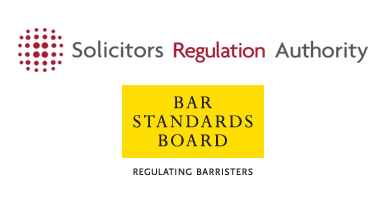
The LLB Law is a qualifying law degree accredited by the Solicitors Regulation Authority and the Bar Standards Board.
Clinics, placements and summer internships
In Goldsmiths’ Law and Policy Clinics, you'll get to confront challenging societal issues through supervised legal research and public engagement activity. Areas of research and public engagement activity covered by the Clinics include immigration, the law of financial wrongdoing, police interrogation, and counter-terrorism law.
We also offer our students access to the University of London Refugee Law Clinic, awarded Best Contribution by a Law School in the LawWorks and Attorney General Student Pro Bono Awards 2023.
You can choose a placement module as an option and are given access to summer internships with internationally leading faculty, as well as social welfare placements in law centres and legal advice clinics across London.
Harvard Law School course
We’re the first law department in the UK to offer students free access to Harvard Law School’s pioneering Zero-L course.
Taught by 18 leading Harvard Law faculty members, it has hours of video lectures, vocabulary, and periodic comprehension checks that you can take at your own pace. The course provides you with an introduction to the legal profession, stages of litigation and citizenship rights, and instruction and practice in basic skills, including how to read a case.
Materials developed by Goldsmiths Law academics to support the delivery of Zero-L direct you to key areas of interest in the programme and give you support to understand how Zero-L strengthens your understanding of English law and helps you to develop legal skills.
Watch videos about your course
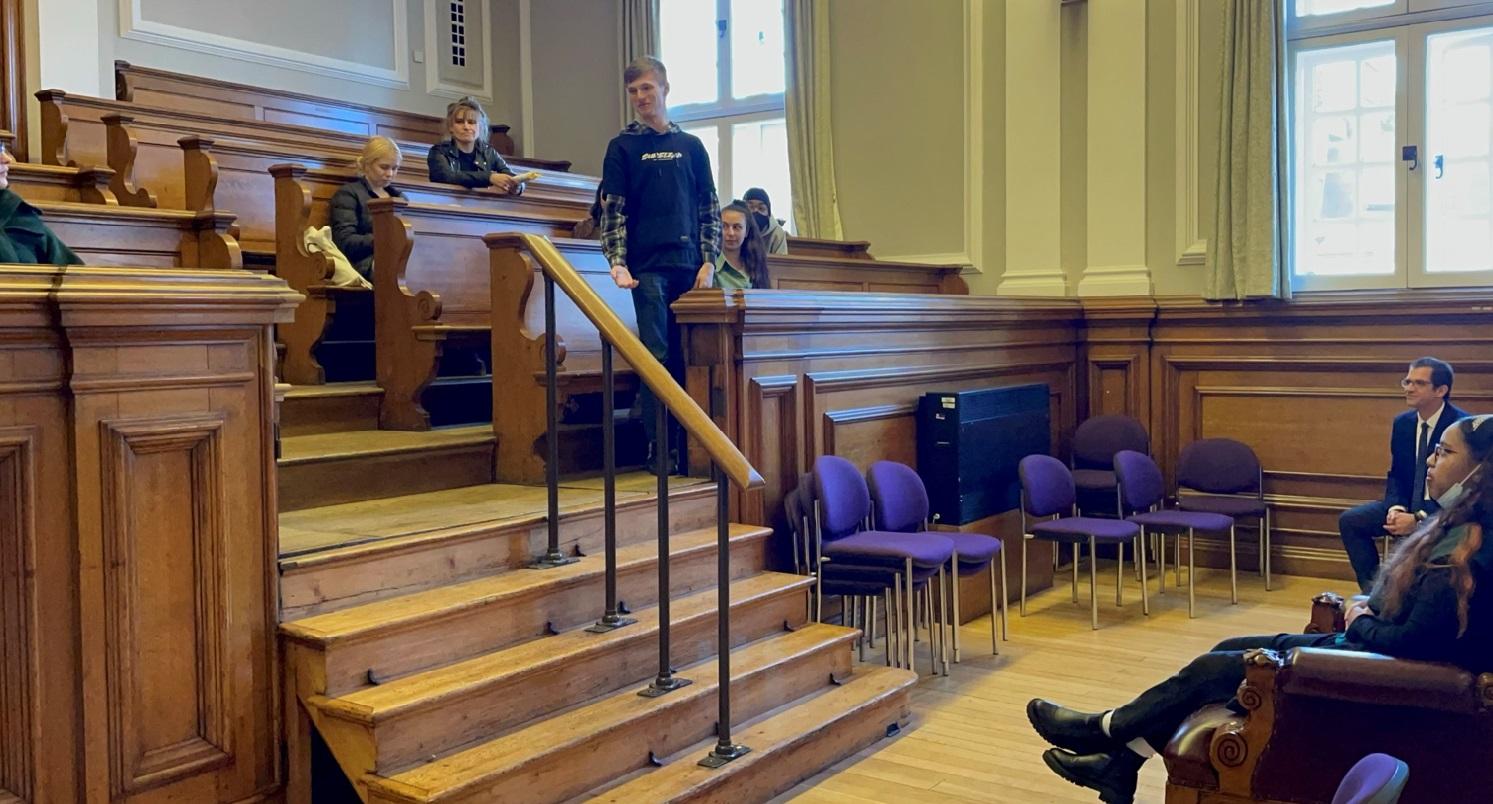
Law students taking part in a mock debate, in Deptford Town Hall's Council Chamber.
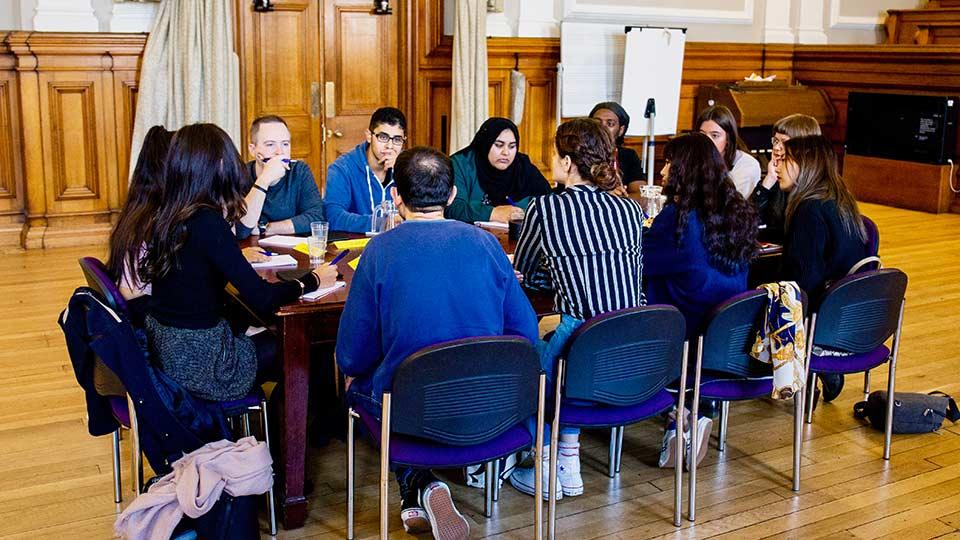
Law students in a mock jury exercise.
What you'll study
You'll take compulsory modules in your first year of the LLB, and then you'll have the opportunity to focus on your interests in the second and third years by choosing from a range of law option modules.
A unique feature of the degree is that you'll also be able to study across a wide range of specialisms, drawing on globally leading expertise in the departments of Sociology, Anthropology, Psychology, Art, and Media, Communications and Cultural Studies.
Year 1 (credit level 4)
You'll study the following compulsory modules:
| Module title | Credits |
|---|---|
| 21st Century Legal Skills | 15 credits |
| Contract Law | 30 credits |
| Criminal Law: Theory and Practice | 30 credits |
| Public Law and the Human Rights Act | 30 credits |
| English Legal System in a Global Context | 15 credits |
Note about optional modules (if available): The above is indicative of the typical modules offered, but is not intended to be construed or relied on as a definitive list of what might be available in any given year. The module content and availability is subject to change.
Teaching style
You'll be taught through lectures, seminars and self-directed learning, but you'll also benefit from more modern and diverse teaching styles, such as blended, experiential and clinical learning, learning through the production of reflective journals, videos and reports, and learning through online or even virtual reality environments.
You’ll also take your learning outside of university with field trips and professional development initiatives such as annual mooting competitions, mock trials and debates, leading to finals at the UK Supreme Court, the Inns of Courts and other prestigious venues.
How you'll be assessed
You’ll be assessed by a variety of methods, depending on your module choices. These include coursework, examinations, reports, case notes, statutory interpretation, critiques of articles, and research projects such as the dissertation.
As well as these traditional assessment methods, you'll also have the option in your second and third years to take modules that are wholly assessed in more innovative ways, such as:
Credits and levels of learning
An undergraduate honours degree is made up of 360 credits – 120 at Level 4, 120 at Level 5 and 120 at Level 6. If you are a full-time student, you will usually take Level 4 modules in the first year, Level 5 in the second, and Level 6 modules in your final year.
What our students say



Student life and support
You'll belong to a close-knit community, supported by a network that includes academic personal tutors, career advisers, disability officers and other student support staff.
We work in small groups in lectures and research seminars, and regularly organise visits to legal London, enabling you to immerse yourself in being connected to this world. The legal, institutional and cultural experiences you will gain studying law in London at Goldsmiths will stay with you forever.
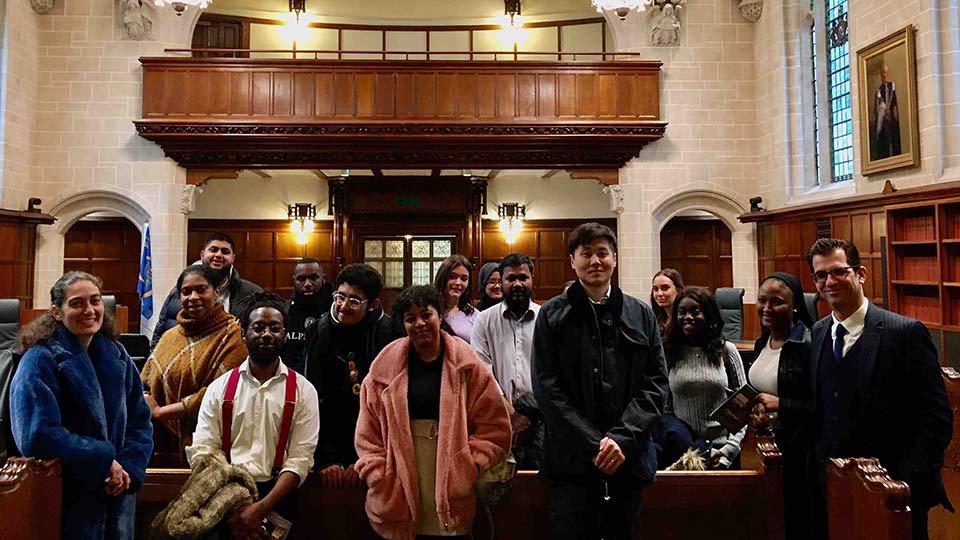
Students after taking part in an interactive workshop at the Supreme Court.

Students in Contract Law during their visit to Facebook (Meta) headquarters in London.
Study abroad, international court visit and our Athens Summer School
We take our students on an annual international court visit. Read our blog to learn more about our visit to the European Court of Human Rights in Strasbourg in 2023, where students attended a Grand Chamber hearing and participated in a workshop with the UK Judge at the Court, Tim Eicke KC.
We also organise an annual summer school in Athens, in collaboration with leading universities there. The week-long intensive programme:
- Provides a range of courses (for example in refugee law and migration studies, EU law, criminal law, law and technology)
- Connects students with high-profile institutions and authorities (such as the British Ambassador and British Council in Greece)
- Gives students unprecedented access to cultural visits and experiences
Read more about our summer school in Athens in 2023.
In recent years, our students have also attended summer schools at the University of Geneva and Amsterdam Law school.
Students are supported through substantial Department of Law scholarships to participate in our summer school and international court visit. Funding is reviewed on a yearly basis. To find out more about funding and other global opportunities at Goldsmiths, visit our Study Abroad pages.
Careers
Preparing you for a successful future
There are many ways the LLB will prepare you for career success, and lots of potential routes you can take – whether you want to become a solicitor or barrister, or apply your skills and knowledge in different areas.
Solicitor or barrister
The LLB will allow you to qualify as a solicitor or a barrister, and throughout your studies you’ll acquire the academic knowledge, professional awareness and skills needed to pursue a dynamic legal career – in England, Wales and internationally.
It is a qualifying law degree (QLD), recognised by the Solicitors Regulation Authority (SRA) and Bar Standards Board (BSB), and has also been designed specifically to provide graduates with a solid foundation to tackle the new Solicitors' Qualifying Examinations (SQE) for all future solicitors and the equivalent training and qualification process to become a barrister.
Find out more about becoming a solicitor or barrister.
Cutting-edge specialisms
Reflecting Goldsmiths’ creative and progressive ethos, the degree also offers opportunities for you to engage with pioneering and future-looking topics that will open up exciting career paths in law and other areas. You’ll be able to develop specialist knowledge in cutting-edge areas of law, such as:
- Artificial intelligence and law
- Commercial law and international trade aggreements
- Media law
- Art law
- Creativity and intellectual property law
- Financial technology
- Criminal law
- Criminology and human rights
You can choose to either explore a variety of modules, or to focus on options that relate to one of the specialist themes that run throughout law at Goldsmiths.
Careers further afield
LLB Law graduates can also pursue career opportunities in a wide range of other areas, such as:
- Human rights and the third sector
- Financial technology and regulation in the financial sector, including compliance
- The civil service
- Journalism, the media and creative industries
- Patent and trademark litigation
- Art and cultural heritage litigation
- The government, for example in relation to immigration or foreign affairs
- Mediation
- The Crown Prosecution Service
- The police or the prison service
- Legal recruitment
- The ‘in-house’ legal practice sector
- Academia
Collaborations, placements and partnerships
Partnerships with leading organisations
Cutting-edge collaborations with global law firms, government organisations, local councils, NGOs, think tanks and academics in world-leading universities support the delivery of all our programmes, exposing you to unique opportunities to grow a strong awareness of future career destinations and develop dynamic professional networks throughout your degree.
These include:
- Linklaters LLP
- Debevoise & Plimpton LLP and Boies Schiller & Flexner LLP
- UK Supreme Court
- National Justice Museum at the Royal Courts of Justice
- Kalisher Trust
- Joint Council for the Welfare of Immigrants and Migrants’ Rights Network
- Fair Trials
- Big Brother Watch
- Liberty
- Crown Prosecution Service
- Law Commission
- Honourable Society of the Inner Temple
- Stanford Law School
- Berkeley Law
- Loyola Law School (Los Angeles)
- New Europeans
- Human Rights Lawyers’ Association
- Forensic Architecture
- Lewisham Borough
- Council of Europe
- British Academy
- Garden Court Chambers
- Doughty Street Chambers
And many others.
Welfare benefits course and Legal Advice Centre placements
We give you access to a welfare benefits course provided by the Pro Bono Community organisation. This prepares you for 3-6 months placements in Legal Advice Centres in London. There are 15 placements in Legal Advice Centres available to our students on an annual basis.
The welfare benefits course has 30 spaces annually, and equips you with foundational knowledge in contemporary areas of legal practice such as benefits for people unable to work due to sickness or disability, universal credit, benefits for migrants, help with housing costs, appeals and advocacy.
The course also has a core introductory element covering the background to Law Centres, legal aid, triage, interview techniques and practical skills.
Dimitrios Giannoulopoulos is Goldsmiths' inaugural Professor of Law. His focus is on comparative criminal evidence and procedure, with emphasis on how human rights norms in criminal justice are applied in national jurisdictions across different legal cultures, particularly in the Anglo-American and Continental European legal cultures. He publishes on topics including police interrogation and suspects' rights, police searches, electronic surveillance and unlawfully obtained evidence. He is an Academic Fellow of the Honourable Society of the Inner Temple.
Expertise across discliplines
At Goldsmiths, we believe that an interdisciplinary approach can bring fresh perspectives and insights to contemporary issues. The LLB Law degree draws on expertise from across a range of disciplines at Goldsmiths, to contextualise your knowledge and provide specialist option modules. Contributing staff from other departments include:
Visiting Professors
The course also features contributions from some of the UK's foremost experts on human rights law, with Visiting Professors including:
- Martha Spurrier, Executive Director of Liberty, the UK’s leading human rights campaigning organisation
- Kirsty Brimelow QC, Head of International Human Rights at Doughty Street Chambers and Chair of the Bar Human Rights Committee
- Sir Geoffrey Nice QC, renowned for leading the prosecution of Slobodan Milosevic and a leading figure international criminal law
- HH Judge Donald Cryan, a family law judge and former Treasurer at the Inner Temple
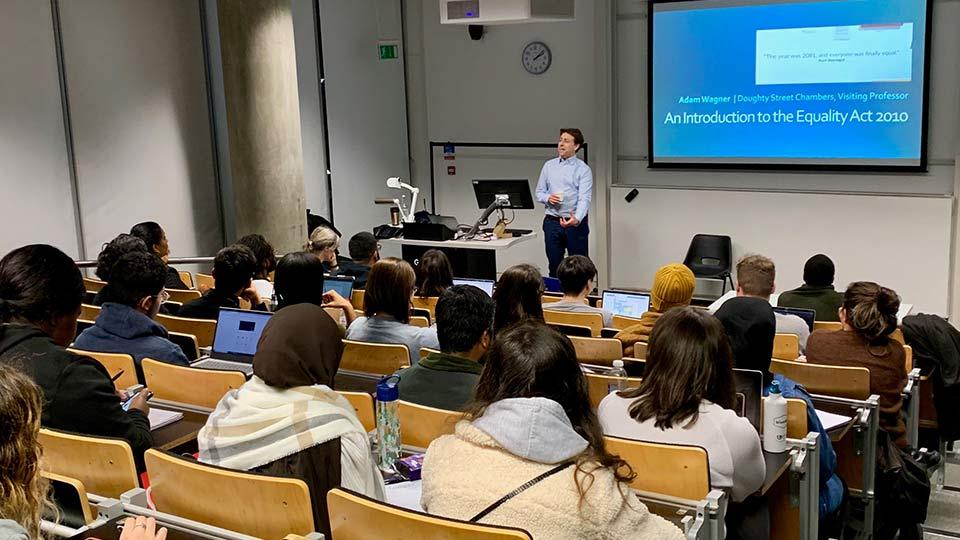
Visiting Professor and leading human rights barrister, Adam Wagner, teaching the Equality Act, drawing on his expertise as counsel to the Equality and Human Rights Commission.

Professor Dimitrios Giannoulopoulos, Head of Goldsmiths Law Department with esteemed Visiting Professor Dominic Grieve KC, former Attorney General for England and Wales.
Entry requirements
We accept the following qualifications:
A-level: ABB
BTEC: DDD
International Baccalaureate: 33 points overall with Three HL subjects at 655
Access: 60 credits overall with 33 distinctions and distinctions/merits in related subjects
Alternative qualifications and experience
See our full list of undergraduate entry qualifications.
We welcome students with a range of educational experiences. If you believe you may not meet the standard qualification requirements we would still encourage you to apply because we consider all aspects of your application when making a decision.
We’ll pay particularly careful attention to your personal statement, which is your opportunity to demonstrate your interest in the subject you’ve applied for. Your referees are also welcome to include any relevant contextual comments around your academic achievements. We’ll look at all these things when making a decision on your application, as well as your qualifications and grades.
International qualifications
We also accept a wide range of international qualifications. Find out more about the qualifications we accept from around the world.
If English isn’t your first language, you will need an IELTS score (or equivalent English language qualification) of 6.5 with a 6.5 in writing and no element lower than 6.0 to study this programme. If you need assistance with your English language, we offer a range of courses that can help prepare you for degree-level study.
Fees and funding
Annual tuition fees
These are the UG fees for students starting their programme in the 2024/2025 academic year.
From August 2021 EU/EEA/Swiss nationals will no longer be eligible for 'Home' fee status. EU/EEA/Swiss nationals will be classified as 'International' for fee purposes, more information can be found on our fees page.
- Home - full-time: £9250
- International - full-time: £19640
If your fees are not listed here, please check our undergraduate fees guidance or contact the Fees Office, who can also advise you about how to pay your fees.
It’s not currently possible for international students to study part-time if you require a Student Visa, however this is currently being reviewed and will be confirmed in the new year. Please read our visa guidance in the interim for more information. If you think you might be eligible to study part-time while being on another visa type, please contact our Admissions Team for more information.
If you are looking to pay your fees please see our guide to making a payment.
Funding opportunities
Successful graduates of this programme will be eligible for a 20% fee waiver to any of our postgraduate law programmes. This can be combined with our general Goldsmiths Alumni Fee Waiver, meaning a 30% reduction in fees (based on Home student fees). Find out more about the LLM Fee Waiver.
We offer a wide range of scholarships and bursaries, and our Careers Service can also offer advice on finding work during your studies. Find out more about funding your studies with us.
Additional costs
In addition to your tuition fees, you'll be responsible for any additional costs associated with your course, such as buying stationery and paying for photocopying. You can find out more about what you need to budget for on our study costs page.
There may also be specific additional costs associated with your programme. This can include things like paying for field trips or specialist materials for your assignments. Please see the programme specification for more information.







